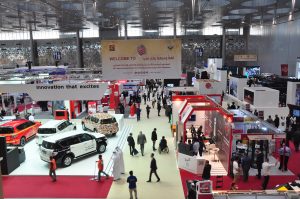28 Jan Exclusive Interview: Marie Lagrenée events director Milipol Qatar
“As an effect of the Covid crisis, we expect to see governmental buyers seeking out new Internet-of-Things (IOT) technologies and smart city-applications”
The Covid 19 pandemic is changing the face of the global homeland security and civil defence market highlight demand for new and maturing technologies which will help push sector growth up by 50% by 2026, according to international analysts.
While the global market is set to reach US $418bn in value by 2022, according to Canada’s Allied Market Research (https://www.alliedmarketresearch.com/homeland-security-market), which represents a 5.9% compound annual growth rate from 2016, the USA’s Homeland Security Research Group says it will surge in net worth to US $658bn by 2026 (https://homelandsecurityresearch.com/reports/global-public-safety-homeland-security-markets-industry-technologies).
Experts say the homeland security and civil defence industry is pivoting to meet demand for new and maturing technologies which have come to the fore to contain the pandemic as nations readdress their future needs in an evolving landscape. Technologies for trace and detection and communication and control are amongst those rising up national agendas including counter-drone systems, big data, smart sensors, 5G, and AI-based cybersecurity and video analytics.
Anyone travelling through Qatar’s Doha Hamad International airport (HIA) can’t fail to see intelligent wearable technology, robots, and temperature screening in action. Airport staff don smart AI driven screening helmets with built-in infrared thermal imaging and augmented reality displays to take and analyse travellers’ temperatures. Robots emit a concentrate UV-C light to kill infectious micro-organism while all checked in baggage, whether arriving, departing or in transit, is disinfected via ultraviolet tunnels.
The aviation industry is just one sector seriously impacted by the pandemic. The health, hospitality, retail, leisure, events, supply and logistics and transport segments have all faced challenges and some of the steps they have taken to control the spread of virus could become part of the post-Covid world as passengers, workers, consumers, and the general public become ever more health conscious with preventative care taking on a mainstream perspective.
And while public facing organisations moved to put safety first, the global incidence of cybercrime rose during lockdowns as bad actors preyed on public concerns and opportunities arising from a rush to work-from-home and hybrid workplace scenarios. Climate change also began to figure ever more in the public consciousness as people welcomed improvements in air quality, a resurgence of wildlife and reductions in noise pollution.
Added to these concerns is an enhanced focus on the need for food security and supply chains, all of this means that in the future all organisations whether public or private sector and no matter their vertical segmentation, will in one way or another be health and security conscious organisations. This requires new technological solutions on a huge scale.
New and maturing technologies will be in focus at Milipol Qatar 2021, the 13th in the biennial series which will run at the Doha Exhibition and Convention Centre (DECC) from March 15-17. It will be the first international showcase for the global homeland security and defence sector since the pandemic took hold.
“The event will help industry players, businessmen and Arab investors get a handle on where the homeland security and civil defence industries are heading in a pandemic and, later, post-Covid world and they will be able to source new partners for the supply and development of the technology and systems that will future proof these sectors,” explained Marie Lagrenée, Milipol events director, the Middle East’s only dedicated exhibition and conference devoted to homeland security and civil defence..
The global industry will be keenly eyeing Milipol Qatar 2021 to see which new technologies can address homeland security health and national gateway access issues in a contact-less world.
“The impact on the biometrics sector, for instance, will be significant,” said Lagrenée. “The event will also be an important knowledge-sharing forum for post-pandemic issues. One of the conference topics addresses future national preparedness for any major health and pandemic crisis.
“As an effect of the Covid crisis, we expect to see governmental buyers seeking out new Internet-of-Things (IOT) technologies and smart city-applications. Such technologies and applications could, for instance, boost analytic capabilities to monitor any future virus infection rates; AI-based predictive behavioural models could serve as early warning devices in case of a viral or pandemic outbreak.
We also expect intense debates about the protection of extremely sensitive personal biometrics. Governments will be looking for solutions to this challenge.”
As Milipol Qatar 2021 draws close with the organisers anticipating participation of 150 exhibitors and close to 6,500 visitors, organisers have outlined an extensive programme of personal safety measures being put in place for the event including a supervised visitor flow protocol.
“Health risks at trade shows are easier to cope with than other major events since the traffic flow is managed over several days. Moreover, personal protection systems, such as equipment and facilities disinfection will be fully in place,” explained Marie Lagrenée, Milipol Events Director. “These types of measures will need to be in place at all events as that industry, like the homeland security and defence sectors, adapts for a next normal future.”


